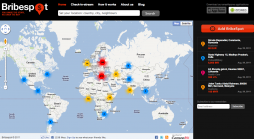corruption
Posted by AnneryanHeatwole on Oct 25, 2011
Following this weekend's Tunisian elections, the world is looking to the Middle East to see how new democracies are born. But in many countries with emerging democracies, fraud and corruption can taint the credibility of elections, and the public's trust in the fairness and validity of election results. We have long argued that technology - mobile technology in particular - can play a key role in helping to ensure fair and accurate voting processes and results. However, data has been missing to make that point more definitively.
In areas where much of the voting process isn't digitized, using technology can help mitigate vote tampering and incorrect results. Additionally, SMS reports of vote tabulation from polling stations by trained election observers can be an effective way of limiting voting fraud and corruption, and has been used in different elections around the world. In Lebanon's 2009 elections, roughly 2500 volunteer citizen observers reported from a statistically significant number of polling station incidence reports throughout election day. In Nigeria, 2011 Project Swift Count deployed 8000 trained election observers across the country to report on the elections, including election results from polling stations directly, using SMS.
| Tech in Election Monitoring: Fighting Fraud and Corruption, one Picture at a Time data sheet 1964 Views |
| Countries: |
Afghanistan
|
Posted by MelissaUlbricht on Aug 29, 2011
Bribespot is a mobile app for Android that allows people to submit reports of corruption and bribes. People can also submit reports on a website and instances are plotted on a map using Google maps API.
In March 2011, Artas Bartas and a team of people from Estonia, Finland, and Lithuania developed the app at Garage48, an event where participants try to pitch and develop an app within 48 hours. Bartas is familiar with issues of corruption; prior to Bribespot, he worked for the UN development program coordinating anti-corruption projects. And, unfortunately, there is demand for an app like Bribespot.
The app has been downloaded 600 times. On the site, about 700 total reports have been submitted and visualized, from around the world.
Posted by AnneryanHeatwole on Nov 18, 2010
Today's Mobile Minute brings you news about the six organizations that won social networking grants from infoDev, the way mobile advertising is used in Europe, the launch of 4G networks in Africa, accusations of rigging in India's bandwidth auctions, and a CGAP series that de-hypes mobile banking with actual data.
- InfoDev announced the winners of its social networking grants for organizations working in Africa and Asia. The winners were Akirachix (Kenya), MoMo Kampala (Uganda), COSTECH (Tanzania), Mobile Monday (Mozambique), CRC Topica (Vietnam), and Young Innovations Pvt. Ltd. (Nepal). The winners received $35,000 U.S. as part of the Creating Sustainable Businesses in the Knowledge Economy program.
Posted by MohiniBhavsar on Sep 16, 2010
The Role of Digital Networked Technologies in the Ukrainian Orange Revolution data sheet 2254 Views
Abstract:
This working paper is part of a series examining how the Internet influences democracy. This report is a narrative case study that examines the role of the Internet and mobile phones during Ukraine's 2004 Orange Revolution. The first section describes the online citizen journalists who reported many stories left untouched by "self-censored" mainstream journalists. The second section investigates the use of digital networked technologies by pro-democracy organizers. This case study concludes with the statement that the Internet and mobile phones made a wide range of activities easier, however the Orange Revolution was largely made possible by savvy activists and journalists wililng to take risks to improve their country.

